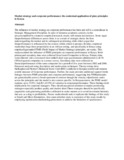| dc.description.abstract | The influence of market strategy on corporate performance has been and still is a centralissue in Strategic Management Discipline. In spite of immense academic curiosity in this area,exemplified by extensive empirical research, results still remain inconclusive. Some argue thatperformance differences across firms is as a result of strategic choice the firm makesregarding the market and its subsequent positioning while others argue that firmperformance is influenced by the context within which it operates. Besides, empirical studiesthat forge these propositions in an African setting, and specifically in Kenya using empiricallygrounded PIMS (Profit Impact of Market Strategy) principles, are scanty. This studyexamined the influence of PIMS principles on corporate performance in Kenya. Both primaryand secondary data were collected from Listed Companies in Kenya. Primary data werecollected vide a structured close ended Likert type questionnaire administered to all 56 CEOsof quoted companies in a census survey. Secondary data were collected on financialperformance of the same companies for a period of five years between 2002 and 2006. Datawere analyzed using descriptive and multivariate techniques. Theory testing show thatKaplan and Norton’s Balanced Score Card (BSC) conforms to Kenyan context and remains aviable measure of Corporate performance. Further, the study provides additional support forthe linkages between PIMS principles and corporate performance, suggesting that PIMSprinciples are generalizable across a broad spectrum of contexts though the veracity ofprediction varies across the principles and the model is also context specific. In Kenyancontext, the PIMS model explains up to 53.9% (Adj.R2 =0.539) of variation in corporateperformance. These findings hold implications for corporate managers. They should payspecial attention to market positioning strategies especially product quality and market share.These strategies should be specifically targeted to cash generating portfolios calibrated in sucha manner as to avoid investment intensity that acts as a drag to profitability. Future studiesshould seek to replicate the findings of this study to Small and Micro Enterprises. Also open tofurther study is extension of this study results by employing optimization methodologyprocedures to address the limitation of spuriousness. | en |

